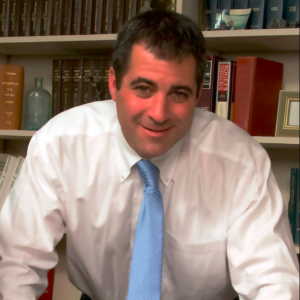New Hampshire’s Supreme Court ruled this week that Granite State courts have seen enough of Portsmouth attorney Justin Nadeau, disbarring him after he was caught doctoring evidence in his ethics case before the Professional Conduct Committee.
“It’s difficult for me to imagine something worse for a lawyer to do,” one PCC member said, according to the court records.
Nadeau, once a Democratic candidate in the First Congressional District, was brought before the PCC after he allegedly got a client who was impaired by a traumatic brain injury, Exeter woman Shawn Fahey, to give him $300,000 in loans in 2018. Nadeau allegedly secured the loans with a condo he did not own, tax liens, and the anticipated proceeds from a pending defamation lawsuit he had against the Portsmouth Police Department.
Nadeau allegedly told Fahey until the defamation lawsuit was resolved he was “strapped for cash.”
The lawsuit against Portsmouth’s police stems from an arrest of Portsmouth man Christian Jennings. Jennings was allegedly found with quantities of marijuana, Ecstasy, amphetamines, a loaded gun, and $42,000 in cash. According to police, Nadeau was handling an $85,000 marina investment for Jennings before the arrest, though the marina deal never closed. Nadeau brought the lawsuit when police opened an investigation into whether or not he was laundering drug money. The defamation case was settled in 2019.
Nadeau also allegedly hid the $165,000 he collected after he sent Fahey to a Massachusetts attorney to handle her injury case. Nadeau reportedly collected referral fees from the Massachusetts attorney as well as other money related to Fahey’s case.
According to the Supreme Court’s disbarment order released Tuesday, Nadeau slow-walked producing documents related to the case to the PCC. The Democrat even destroyed his computer before the hearing. Nadeau claims he made all the appropriate conflict of interest disclosures and eventually produced printed copies of the letter he claimed he sent her.
However, James Berriman, the computer expert hired by the PCC, looked through Nadeau’s office server and found the dates on the documents Nadeau gave to the committee were fake, and the documents were created well after he took the money from Fahey.
“As a member of the PCC observed at oral argument before the PCC, ‘the Berriman Report and the spoliation of evidence, in my mind . . . is one of the most significant violations I have seen in decades of practice before the ADO before joining this committee,’” the court ruling states.
Nadeau argued that disbarment is too harsh a penalty, but the Court found that his “deliberate, multi-year effort to deceive the disciplinary authority” and the ethics complaints involved in Fahey’s case make un-lawyering him appropriate.
Nadeau’s father, J.P. Nadeau, agreed to resign from the New Hampshire Bar Association in 2009 after he was investigated for a conflict of interest for representing a construction company involved in a dispute with Justin Nadeau.
Nadeau once had hopes of higher office, running an ultimately unsuccessful campaign against then-Congressman Jeb Bradley (R). Nadeau’s campaign was spearheaded by Steve Marchand, Portsmouth’s former mayor who ,himself went on to unsuccessful runs for higher office. In recent years, Marchand has been warned by the New Hampshire Attorney General’s Office for skirting campaign laws.



